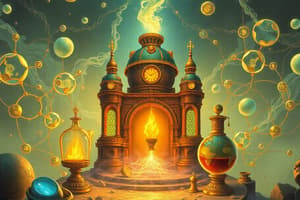Podcast
Questions and Answers
What is organic chemistry?
What is organic chemistry?
The study of structure, properties, and reactions of organic compounds containing carbon atoms.
Who is known for the doctrine of vitalism in organic chemistry?
Who is known for the doctrine of vitalism in organic chemistry?
Jons Jakob Berzelius
What are hydrocarbons?
What are hydrocarbons?
Compounds that consist only of carbon and hydrogen.
What significant contribution did Justus von Liebig make?
What significant contribution did Justus von Liebig make?
Who synthesized urea using ammonium cyanate?
Who synthesized urea using ammonium cyanate?
Who introduced the concept of homologous series?
Who introduced the concept of homologous series?
What is stereoisomerism?
What is stereoisomerism?
Organic chemistry only deals with compounds derived from living organisms.
Organic chemistry only deals with compounds derived from living organisms.
Match the following chemists with their contributions:
Match the following chemists with their contributions:
What compound did Hermann Kolbe synthesize?
What compound did Hermann Kolbe synthesize?
What was William Henry Perkin known for?
What was William Henry Perkin known for?
Flashcards are hidden until you start studying
Study Notes
Overview of Organic Chemistry
- Organic chemistry studies the structure, properties, and reactions of carbon-containing compounds.
- Organic reactions are essential for synthesizing natural products, pharmaceuticals, and polymers.
Key Historical Figures and Contributions
-
Jons Jakob Berzelius (1779-1848)
- Explored structural isomerism in carbon compounds.
- Identified compounds like formic acid, salicylic acid, and urea.
- Proposed vitalism, suggesting that living organisms possess a vital principle beyond physical processes.
-
Justus von Liebig (1803-1873) & Friedrich Wohler (1800-1882)
- Pioneered modern organic chemistry in the 19th century.
- Liebig measured carbon, hydrogen, and nitrogen contents in organic compounds.
- Wohler synthesized urea from ammonium cyanate, demonstrating organic compound formation from inorganic substances.
-
Jean-Baptiste André Dumas (1800-1884)
- Collaborated with Liebig on radical theory.
- Developed methods for converting acetic acid to trichloroacetic acid.
-
Auguste Laurent (1808-1853) & Charles Frédéric Gerhardt (1816-1856)
- Proposed the type theory, emphasizing organic synthesis from simpler molecules.
- Laurent introduced homologous series, exemplified by the alkane series (methane, ethane, propane).
-
Hermann Kopp (1817-1892)
- Established the correlation between molecular structure and physical properties, such as boiling points linked to molecular size.
-
Alexander Williamson (1824-1904)
- Synthesized diethyl ether, providing insights into ether chemistry.
-
Edward Frankland (1825-1896)
- Developed the concept of valence, essential for understanding chemical bonding.
- Established theories of multiple valences using phosphorus trichloride and pentachloride as examples.
-
August Kekulé (1829-1896)
- Proposed the tetravalent nature of carbon and its ability to form chains.
- Credited for the structural model of benzene.
-
Archibald Scott Couper (1831-1892)
- Introduced molecular structures using dotted lines to represent bonds.
-
Alexander Crum Brown (1838-1922)
- Created graphical structural formulas to depict compounds.
-
Louis Pasteur (1822-1895), Jacobus Van’t Hoff (1852-1911), Joseph-Achille Le Bel (1847-1930)
- Explored stereoisomerism and its three-dimensional aspects, notably in tartaric acid, which displays optical activity.
-
Emil Fischer (1852-1919)
- Conducted studies on stereoisomers of glucose with multiple centers of asymmetry.
-
August Wilhelm von Hofmann (1818-1892)
- Investigated coal tar's components, isolating key aromatic hydrocarbons such as aniline, ammonia, and phenol.
-
William Henry Perkin (1838-1907)
- Discovered synthetic dyes, notably producing mauveine from aniline, marking a breakthrough in synthetic organic chemistry.
Important Developments in the 19th and 20th Centuries
- 19th Century: Focused on synthesizing new molecules and understanding natural products.
- 20th Century: Shifted to studying organic reactions and mechanisms, laying the groundwork for modern organic chemistry.
Categories of Discoveries in Organic Chemistry
- Based on Sources
- Carbonized organic matter: gasoline, coal, natural gas.
- Living organisms: natural dyes and flavorings.
- Inventions: medicines (e.g., antibiotics), acetic acid, fertilizers.
Notable Medicinal Discoveries
-
Paul Ehrlich (1854-1915)
- Developed organoarsenic compounds for syphilis treatment, particularly Neosalvarsan.
-
Penicillin
- Initially used in 1942, became a crucial antibacterial agent.
-
DDT (Dichloro-Diphenyl-Trichloroethane)
- Utilized during WWII for pest control and prevention of disease spread.
Concluding Insights
- The historical progression of organic chemistry greatly influenced the development of pharmaceuticals, agricultural practices, and various synthetic products.
- The collaboration and competition among scientists led to key advancements that shaped modern chemistry.
Studying That Suits You
Use AI to generate personalized quizzes and flashcards to suit your learning preferences.




